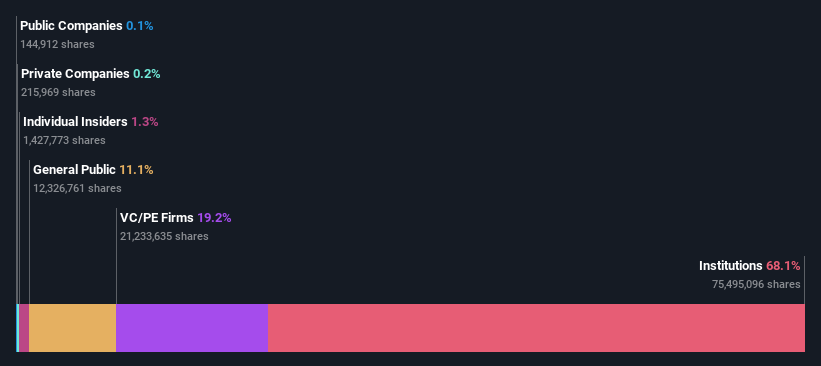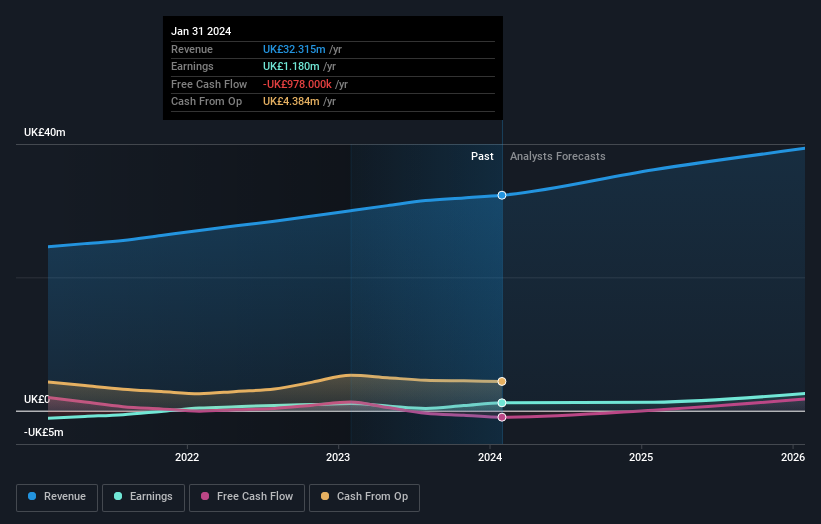1Spatial Plc's (LON:SPA) large institutional owners must be happy as stock continues to impress, up 14% over the past week
Key Insights
Given the large stake in the stock by institutions, 1Spatial's stock price might be vulnerable to their trading decisions
The top 4 shareholders own 56% of the company
If you want to know who really controls 1Spatial Plc (LON:SPA), then you'll have to look at the makeup of its share registry. The group holding the most number of shares in the company, around 68% to be precise, is institutions. Put another way, the group faces the maximum upside potential (or downside risk).
And last week, institutional investors ended up benefitting the most after the company hit UK£84m in market cap. The one-year return on investment is currently 50% and last week's gain would have been more than welcomed.
In the chart below, we zoom in on the different ownership groups of 1Spatial.
View our latest analysis for 1Spatial
What Does The Institutional Ownership Tell Us About 1Spatial?
Institutional investors commonly compare their own returns to the returns of a commonly followed index. So they generally do consider buying larger companies that are included in the relevant benchmark index.
As you can see, institutional investors have a fair amount of stake in 1Spatial. This implies the analysts working for those institutions have looked at the stock and they like it. But just like anyone else, they could be wrong. When multiple institutions own a stock, there's always a risk that they are in a 'crowded trade'. When such a trade goes wrong, multiple parties may compete to sell stock fast. This risk is higher in a company without a history of growth. You can see 1Spatial's historic earnings and revenue below, but keep in mind there's always more to the story.
Since institutional investors own more than half the issued stock, the board will likely have to pay attention to their preferences. We note that hedge funds don't have a meaningful investment in 1Spatial. Looking at our data, we can see that the largest shareholder is Columbia Management Investment Advisers, LLC with 20% of shares outstanding. With 17% and 12% of the shares outstanding respectively, Canaccord Genuity Asset Management Limited and Azini Capital Partners LLP are the second and third largest shareholders. Additionally, the company's CEO Claire Milverton-Clark directly holds 0.6% of the total shares outstanding.
On looking further, we found that 56% of the shares are owned by the top 4 shareholders. In other words, these shareholders have a meaningful say in the decisions of the company.
While studying institutional ownership for a company can add value to your research, it is also a good practice to research analyst recommendations to get a deeper understand of a stock's expected performance. There is a little analyst coverage of the stock, but not much. So there is room for it to gain more coverage.
Insider Ownership Of 1Spatial
The definition of company insiders can be subjective and does vary between jurisdictions. Our data reflects individual insiders, capturing board members at the very least. Company management run the business, but the CEO will answer to the board, even if he or she is a member of it.
Insider ownership is positive when it signals leadership are thinking like the true owners of the company. However, high insider ownership can also give immense power to a small group within the company. This can be negative in some circumstances.
Shareholders would probably be interested to learn that insiders own shares in 1Spatial Plc. As individuals, the insiders collectively own UK£1.1m worth of the UK£84m company. It is good to see some investment by insiders, but we usually like to see higher insider holdings. It might be worth checking if those insiders have been buying.
General Public Ownership
With a 11% ownership, the general public, mostly comprising of individual investors, have some degree of sway over 1Spatial. While this size of ownership may not be enough to sway a policy decision in their favour, they can still make a collective impact on company policies.
Private Equity Ownership
With a stake of 19%, private equity firms could influence the 1Spatial board. Some might like this, because private equity are sometimes activists who hold management accountable. But other times, private equity is selling out, having taking the company public.
Next Steps:
It's always worth thinking about the different groups who own shares in a company. But to understand 1Spatial better, we need to consider many other factors.
Many find it useful to take an in depth look at how a company has performed in the past. You can access this detailed graph of past earnings, revenue and cash flow.
If you are like me, you may want to think about whether this company will grow or shrink. Luckily, you can check this free report showing analyst forecasts for its future.
NB: Figures in this article are calculated using data from the last twelve months, which refer to the 12-month period ending on the last date of the month the financial statement is dated. This may not be consistent with full year annual report figures.
Have feedback on this article? Concerned about the content? Get in touch with us directly. Alternatively, email editorial-team (at) simplywallst.com.
This article by Simply Wall St is general in nature. We provide commentary based on historical data and analyst forecasts only using an unbiased methodology and our articles are not intended to be financial advice. It does not constitute a recommendation to buy or sell any stock, and does not take account of your objectives, or your financial situation. We aim to bring you long-term focused analysis driven by fundamental data. Note that our analysis may not factor in the latest price-sensitive company announcements or qualitative material. Simply Wall St has no position in any stocks mentioned.

 Yahoo Finance
Yahoo Finance 

